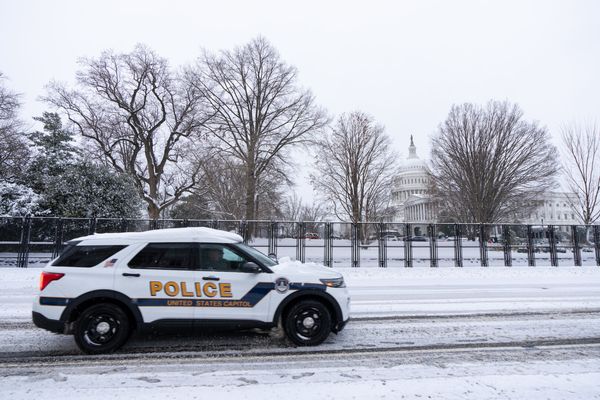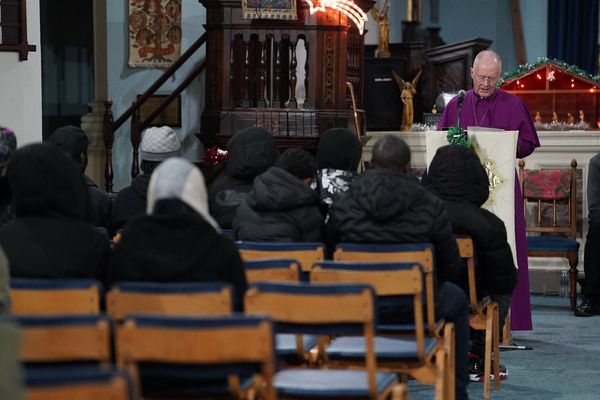
Kyiv (AFP) - Desperate civilians fled besieged Ukrainian cities on Tuesday as US President Joe Biden looked set to announce a ban on Russian oil imports to punish Moscow for the invasion.
The expected announcement by Biden would further tighten unprecedented sanctions on Russia, targeting the economic lifeline that is bankrolling President Vladimir Putin's war.
Russia agreed to set up "humanitarian corridors" from four cities on the 13th day of the war, even as the UN said the number of refugees flooding across Ukraine's borders had passed two million.
Buses streamed out through an evacuation corridor from the north-eastern city of Sumy -- where 21 people were killed in air strikes overnight -- while civilians on foot took an unofficial escape route out of the bombarded Kyiv suburb of Irpin.
But Ukraine accused Russia of attacking another of the corridors leading from the beleaguered southern port city of Mariupol, where aid workers said tens of thousands were living in "apocalyptic" conditions.
Kyiv has branded the corridors from four cities a publicity stunt as many of the exit routes lead into Russia or its ally Belarus.Both sides accuse each other of ceasefire violations.
The Russian invasion of Ukraine has sparked fears of a wider European or even global conflict, and unleashed the continent's fastest growing refugee crisis since World War II.
Sweeping international sanctions have failed to persuade Putin to back down, leading Western nations to consider an energy embargo despite the likely pain to their own economies.
Crude prices surged after the White House said Biden would speak at 1545 GMT to "announce actions to continue to hold Russia accountable for its unprovoked and unjustified war on Ukraine".
'Hiding in the basement'
Russian troops are slowly encroaching on Kyiv despite intense efforts by outgunned Ukrainian forces, and moving faster through the east and north of the country.
Despite the sound of nearby shelling in Irpin, seen as a critical point for the advance on the capital, civilians fled in icy wind and a thick snowfall, AFP reporters saw.
People waited in a long line to cross over the Irpin river on makeshift walkways of planks and mangled metal, after the Ukrainians blew up the bridge leading into the capital to hamper any Russian advance.
"I didn't want to leave, but there's nobody left in the homes around us, no water, no gas and no electricity," Larissa Prokopets, 43, told AFP.
She said she was leaving after several days spent "hiding in the basement" of her home, which kept "shaking" due to bombardment nearby.
Russia had refused calls for a humanitarian corridor in Irpin and the nearby suburbs of Bucha and Gostomel "although we had everything ready for this," Ukrainian interior ministry official Anton Gerashchenko said.
Evacuations had however begun in Sumy, near the Russian border and 350 kilometres (218 miles) east of Kyiv, where Russia had formally declared a humanitarian corridor, officials said.
Dozens of buses had already left in the direction of Lokhvytsia, to the southwest, said the interim chief of the Poltava region, Dmitry Lunin.The corridor is designed to evacuate civilians, including Chinese, Indians and other foreigners, officials said.
The evacuation came after 21 people, including two children, were killed in Sumy when "enemy planes insidiously attacked apartment buildings," Ukrainian rescue services said.
Three people were killed and three children wounded by landmine in Chernihiv, north of Kiev, officials said.
'Alone, exhausted, frightened'
Ukraine's defence ministry has also accused Russia on Tuesday of violating a ceasefire to ease a days-long blockade of Mariupol, describing it as "genocide".
A six-year-old girl identified only as Tanya has died from dehydration under the rubble of her destroyed home in Mariupol, the city council said
"In the last minutes of her life she was alone, exhausted, frightened and terribly thirsty," Mayor Vadym Boychenko said.
Long queues of cars snaked out of the southern city of Mykolaiv, where sporadic shell fire could be heard.
"We're leaving as soon as possible.There are attacks every day, it's terrifying," said Sabrina, 19, who had a dog on a lead and a cat in her jacket.She said she had no news from her husband who was on the frontline.
Ukrainian President Volodymyr Zelensky denounced what he called unkept promises by the West to protect his country, and renewed calls for a no-fly zone that leaders have so far dismissed.
"It's been 13 days we've been hearing promises, 13 days we've been told we'll be helped in the air, that there will be planes," Zelensky said on a video broadcast on Telegram.
Global outrage mounted over the invasion and the plight of civilians caught up in the bloodshed.
The International Committee of the Red Cross said Mariupol residents faced "atrocious" conditions and were running out of food, water and medical supplies.
"The bottom line today is that this situation is really apocalyptic for people," ICRC head of media Ewan Watson said in Geneva.
At least 474 civilians have been killed since the start of Russia's assault on its ex-Soviet neighbour, according to the UN, although it believes the real figures to be "considerably higher".
'Catastrophic consequences'
The onslaught has created a huge refugee crisis for European countries that have taken in Ukrainians fleeing the conflict, particularly Poland.
"It doesn't stop," Filippo Grandi, the UN High Commissioner for Refugees, said as he announced that two million people had fled.
Germany and Spain meanwhile said they were probing possible Russian war crimes in Ukraine, adding to an investigation by the International Criminal Court into any alleged crimes by either side.
Russia has warned Western countries against becoming involved in the conflict, and said oil sanctions would have "catastrophic consequences".
Putin has equated sanctions with a declaration of war and put nuclear forces on alert.He has pledged the "denazification" of Ukraine and demands its "neutralisation" and demilitarisation.
At home, Russia has cracked down on dissent, arresting more than 10,000 people for anti-war protests and clamping down on independent media.
The west has so far steered clear of the no-fly zone demanded by Zelensky, with Putin warning it would be considered as "participation in the conflict" with nuclear-armed Russia.
burs-dk/yad







